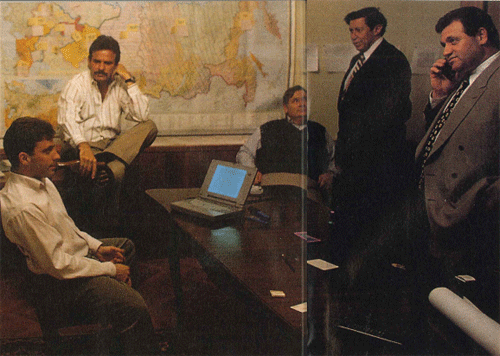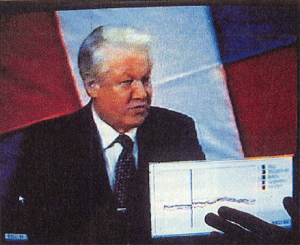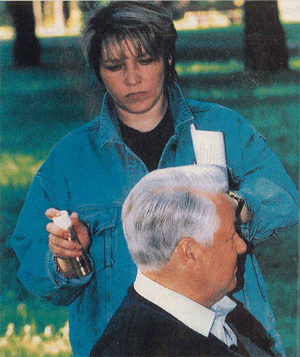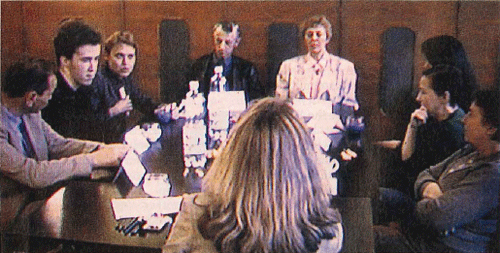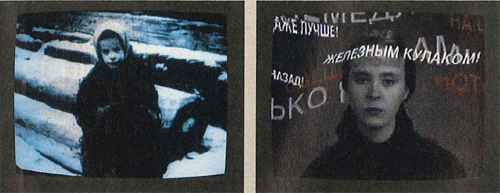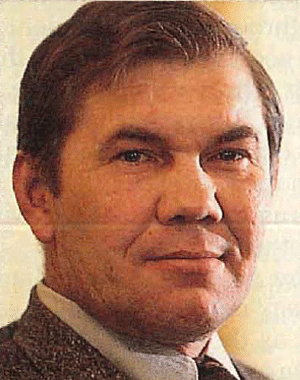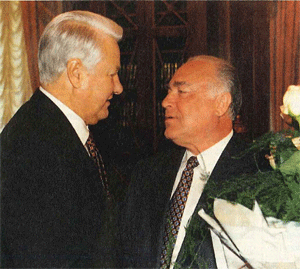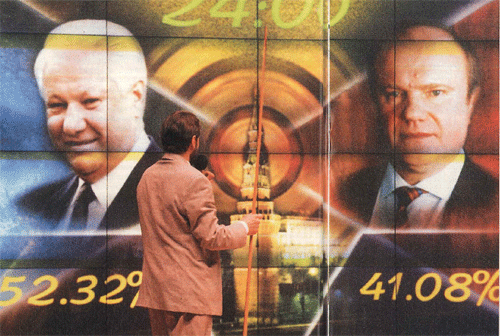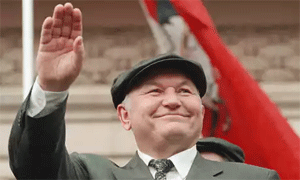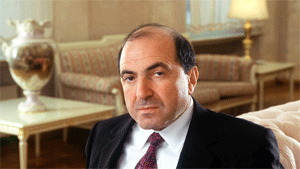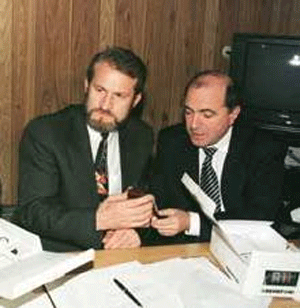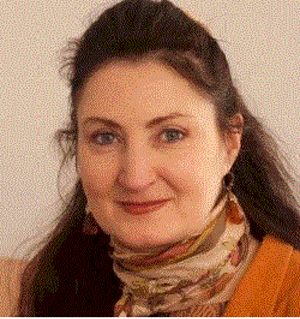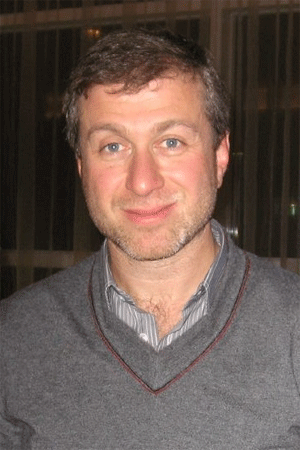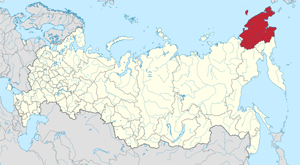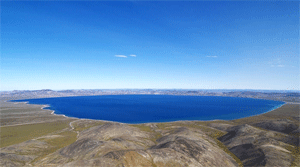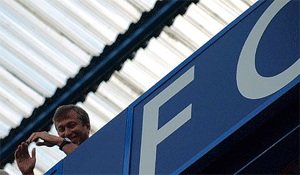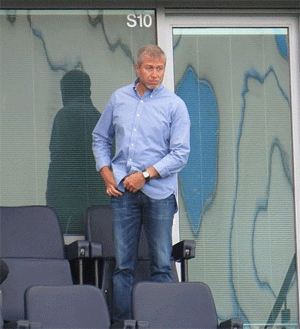Re: Boris Berezovsky (businessman), by Wikipedia
Yanks to the Rescue: The Secret Story of How American Advisers Helped Yeltsin Win
by Michael Kramer
Moscow
Time Magazine
July 15, 1996
NOTICE: THIS WORK MAY BE PROTECTED BY COPYRIGHT
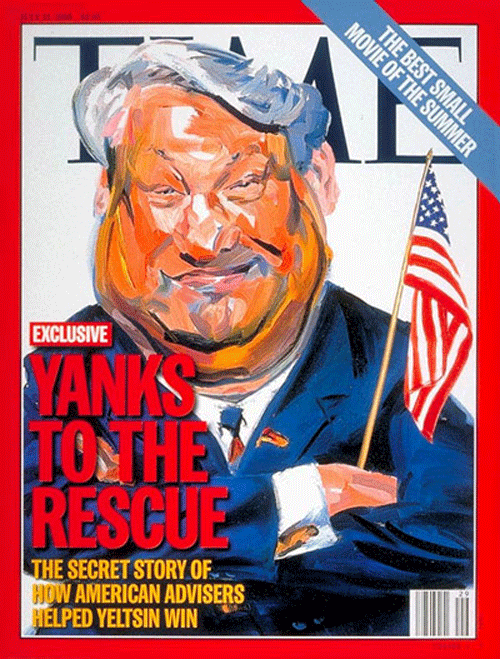
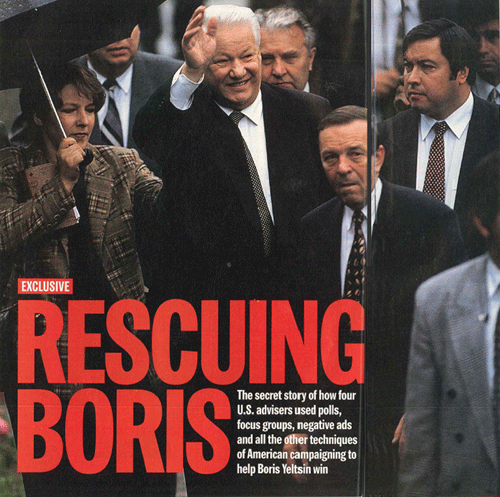
Four More Years: Yeltsin campaigns with his daughter shortly before the final vote
Exclusive: Rescuing Boris: The secret story of how four U.S. advisers used polls, focus groups, negative ads and all the other techniques of American campaigning to help Borin Yeltsin win
IN THE END THE RUSSIAN PEOPLE CHOSE -- AND CHOSE decisively -- to reject the past. Voting in the final round of the presidential election last week, they preferred Boris Yeltsin to his Communist rival Gennadi Zyuganov by a margin of 13 percentage points. He is far from the ideal democrat or reformer, and his lieutenants Victor Chernomyrdin and Alexander Lebed are already squabbling over power, but Yeltsin is arguably the best hope Russia has for moving toward pluralism and an open economy. By reelecting him, the Russians defied predictions that they might willingly resubmit themselves to communist rule.
The outcome was by no means inevitable. Last winter Yeltsin's approval ratings were in the single digits. There are many reasons for his change in fortune, but a crucial one has remained a secret. For four months, a group of American political consultants clandestinely participated in guiding Yeltsin's campaign. Here is the inside story of how these advisers helped Yeltsin achieve the victory that will keep reform in Russia alive.
ALL DURING THE LONG EVENING of Dec. 17, 1995, Felix Braynin sat transfixed before a television set in the living room of a government guest house in Moscow. He didn't like what he saw. Returns from the elections for the Duma, the lower of Russia's parliament, represented a devastating setback for reform-minded parties, including the one linked to Boris Yeltsin. The Communists and their allies were on their way to controlling the body, a disturbing development because in six months Russians would vote for President. Yeltsin's standing in the polls was abysmal, a reflection of his brutal misadventure in Chechnya; his increasing authoritarianism; and his economic reform program, which has brought about corruption and widespread suffering. Considering the country's deep dislike of Yeltsin and the Communists' surge, Braynin, a close friend of some of Yeltsin's top aides, thought that something radical had to be done.
A compact, powerfully built former professional hockey and soccer player in his native Belarus, Braynin, 48, had immigrated to San Francisco in 1979. With $200 in his pocket, he began painting houses. He is now a wealthy management consultant who advises Americans interested in investing in Russia.
Most of Yeltsin's confidants believed the President would be magically reelected despite the Duma catastrophe, but Braynin thought otherwise. The President, he reasoned, could lose without the same kind of professional assistance U.S. office seekers employ as a matter of course. Braynin began a series of confidential discussions with Yeltsin's aides, including one with First Deputy Prime Minister Oleg Soskovets, who at the time was in charge of the President's nascent re-election effort. Finally, in early February, Braynin was instructed to "find some Americans" but to proceed discreetly. "Secrecy was paramount," says Braynin. "Everyone realized that if the Communists knew about this before the election, they would attack Yeltsin as an American tool. We badly needed the team, but having them was a big risk."
To "find some Americans," Braynin worked through Fred Lowell, a San Francisco lawyer with close ties to California's Republican Party. On Feb. 14, Lowell called Joe Shumate, a G.O.P. expert in political data analysis who had served as deputy chief of staff to California Governor Pete Wilson. Since Wilson's drive for the 1996 Republican presidential nomination had ended almost before it began, Lowell thought Shumate and George Gorton, Wilson's longtime top strategist, might be available to help Yeltsin. They were -- and they immediately enlisted Richard Dresner, a New York-based consultant who had worked with them on many of Wilson's campaigns.
Dresner had another connection that would prove useful later on. In the late 1970s and early '80s, he had joined with Dick Morris to help Bill Clinton get elected Governor of Arkansas. As Clinton's current political guru, Morris became the middleman on those few occasions when the Americans sought the Administration's help in Yeltsin's re-election drive. So while Clinton was uninvolved with Yeltsin's recruitment of the American advisers, the Administration knew of their existence -- and although Dresner denies dealing with Morris, three other sources have told TIME that on at least two occasions the teams contacts with Morris were "helpful."
A week after the Valentine's Day call from Lowell, Dresner was in Moscow. The Yeltsin campaign was at sea. Five candidates, led by Communist Gennadi Zyuganov, were ahead of Yeltsin in some polls. The President was favored by only 6% of the electorate and was "trusted" as a competent leader by an even smaller proportion. "In the U.S.," says Dresner, "you'd advise a pol with those kinds of numbers to get another occupation."
For two days the supersecretive Yeltsin high command avoided Dresner, and none of the team ever actually met the President. "There are too many factions and too many leaks to risk your dealing with him directly," Braynin explained to Dresner. "You are our biggest secret."
Then, at 3 p.m. on Feb. 27, Dresner met with Soskovets. In English, the First Deputy Prime Minister asked, "How's our friend Bill doing?" Most of the hour-long session was spent discussing Clinton's reelection prospects. Dresner had prepared a five-page proposal that called for the Americans to "introduce your campaign staff to sophisticated methods of message development, polling, voter contact and campaign organization."
Soskovets had already read Dresner's paper and pointed to a calendar on his desk The days remaining before the presidential election's first round on June 16 were highlighted in large, bold numbers. "There's not much time," he said. "You are hired. I will tell the President that we have the Americans." And then Soskovets ominously added a thought that would reverberate in early May. Alluding to Yeltsin's poor standing and the reluctance of his aides ever to yield power to the Communists, Soskovets told Dresner, "One of your tasks is to advise us, a month from the election, about whether we should call it off if you determine that we're going to lose."
To preserve security, a contract was drawn between the International Industrial Bancorp Inc. of San Francisco (a company Braynin managed for its Moscow parent) and Dresner-Wickers (Dresner's consulting firm in Bedford Hills, New York). The Americans would work for four months, beginning March 1. They would be paid $250,000 plus all expenses and have an unlimited budget for polling, focus groups and other research. A week later, they were working full time, but the boss was not Soskovets.
Over the past few months, the Russian and Western press have identified six different people as Yeltsin's campaign manager. In fact, the person really in charge was Yeltsin's daughter Tatiana Dyachenko, 36, a computer engineer with no previous political experience. While those in the campaign's upper reaches have always known that Dyachenko was the key cog in the apparatus -- if only because she alone saw the man she routinely calls "Papa" on a daily basis -- her role has been widely misunderstood. After dodging the media for months, Dyachenko last week described her job to the Russian press: ''I'm kind of involved in everything. I'm everywhere -- everywhere there's a weak link."
THE HISTORY OF "TATIANA'S emergence is really quite simple," explains Valentin Yumachev, Yeltsin's close friend and ghostwriter. "The President decided in February that the campaign Soskovets was running was going nowhere. He needed someone he could trust completely, and she was it." None of Yeltsin's other senior campaign officials was "what you would call pleased with Tatiana's placement," adds Pavel Borodin, Yeltsin's Minister of the Presidency, the government's general-services manager. "But because she had no personal agenda they couldn't plot against her. Her power obviously derived from that, but also from her native intelligence and the knowledge she gained from the Americans, who brought us a professionalism and dispassion none of us was really used to."
The American team hired two young men, Braynin's son Alan and Steven Moore, a public relations specialist from Washington, to assist them, and promptly established its office in a two-room suite at the President Hotel. The Americans lived elsewhere in the hotel and were provided with a car, a former KGB agent as a driver, and two bodyguards. They were told they should assume that their phones and rooms were bugged, that they should leave the hotel only infrequently, and that they should avoid the campaign's other staff members.
The Americans managed to hide their identity for many months. In interviewing various polling and focus-group companies before hiring three, they described themselves as representing Americans eager to sell thin-screen televisions in Russia. "That story held for far longer than it ever should have," says Shumate. The Americans carried multiple-entry visas identifying them as working for the ''Administration of the President of the Russian Federation," a bit of obviousness that constantly threatened to undermine all the supposed secrecy surrounding their real work.
The President is not a normal hotel. It is owned by the office of the President, and residence is by invitation only. A fence surrounds the property, which is patrolled by police armed with machine guns and wearing bulletproof vests. When Dyachenko moved her own office to the hotel to be near the Americans, the rest of the campaign took three floors of offices there as well. Yeltsin's badly split Russian advisers quickly set up separate fiefdoms on the eighth, ninth and 10th floors. Dyachenko worked almost exclusively on the 11th in Room 1119, directly across the hall from the Americans in 1120. She and they shared two secretaries, a translator, and fax, copying and computer-printing machines.
By the end, the team's office resembled a typical American campaign headquarters. Soda bottles and old food shared space with computer printouts. Graphs charting Yeltsin's progress in the polls hung on the walls, and the entire scene was dominated by a color-coded map of Russia with Post-it notes describing the vote expected in the nation's various regions. A safe stood unused, and documents intended for a shredder remained intact, in plain view.
Gorton followed Dresner to Moscow and encountered in Dyachenko a shy, intelligent and idealistic young woman who for some time recoiled at even the most mild American-style dirty trick. "But it wouldn't be fair," Gorton recalls her saying when he advised that Zyuganov be trailed by heckling "truth squads" designed to goad him into losing his temper. At their first meeting across a long table covered in green felt, Dyachenko confided, "I don't know this business. I don't know what to ask." For a few weeks, says Gorton, "the task was simple education, Campaigning 101, stuff like the proper uses of polling and the need to test via focus groups just about everything the campaign was doing, or thinking of doing."
Yeltsin's staff brought a set of potentially disastrous biases to the campaign. They thought the polls they read in the papers were good enough to determine strategy, and because so many of their allies had failed miserably in the Duma elections despite spending huge sums on television commercials, they believed political advertising was useless in Russia.
But the polling was inaccurate and unsophisticated and thus virtually useless in determining how thematically to guide the effort. "The pollsters asked mostly horserace questions," explains Dresner. "The focus-group operators were in love with indirection and literally asked people to answer questions like, 'If Yeltsin were a tree, what kind of tree would he be?' We needed to know whether voters would move to Yeltsin if he adopted a particular policy, but for that crucial purpose the research in hand was totally uninformative. As for the TV spots used in the Duma elections, they were creative and pretty, but they were far from hard-hitting. ''All of that," says Shumate, "had to be explained to a group of people who, no matter their professed commitment to democracy, were trapped in a classic Soviet mind-set. They thought they could win simply by telling big shots like the directors of factories to instruct their employees how to vote."
Starting from scratch, Gorton calmly explained to Dyachenko that she and her colleagues must suspend their beliefs. "You live in Moscow and travel in the most elite circles," he said. "Because you're smart, you are used to trusting your instincts. You can't do that in this kind of work. You have to know what the people you don't know are thinking."
And then the team went to work. A great deal of their communication with Dyachenko and Yeltsin's other aides was conducted by written memorandums. "Translation was a constant problem," says Dresner. "We spent a full day trying to convey what we meant by having Yeltsin stay 'on message." Minister Borodin says, "Having the memos let the President consider them calmly. We had many discussions about the recommendations and in the end adopted most everything the Americans advised."
One of the team's first memos, designed to buy time for the Americans as they gave themselves a crash course on Russia, was titled "Why Bush Lost." Actually, the parallels were eerie. George Bush's complacency almost exactly resembled Yeltsin's. Like Bush's, the Yeltsin team thought the nation's economy was improving and that the President would receive credit for it; in fact, only a small segment of the population enjoys whatever progress there has been. Like Bush, Yeltsin simply refused to believe that the voters would elect his opponent. Like Bush's, the Yeltsin campaign was in disarray as factions fought for control. And also as with Bush, there was no clearly focused Yeltsin message, just a melange of ideas -- and even then, no disciplined plan for their delivery or appreciation of the need for such a plan.
Even a cursory reading of the Russian press quickly convinced the Americans that virtually the entire nation was furious about the salaries government workers had been owed for months on end. When Yeltsin's aides explained that the President had already promised to correct the back-pay problem, the droopy-eyed Dresner shook his head in disbelief. "You can't just promise these things," he told Dyachenko. "You have to do them. And then you have to make sure the people know what you've done."
That remark presaged a campaign-long insistence on a standard American campaign practice -- repetition. "Whatever it is that we're going to say and do," Gorton explained to Yeltsin's aides, "we have to repeat it between eight and 12 times." Those numbers were invented. "The Russians believe that anything that's worthwhile is scientifically based," says Shumate. "This gave us a leg up when we started to seriously use focus groups to guide campaign policy, but right at the start it let us pretend that we knew more than we really did. There's no data supporting how many times something needs to be repeated, but the Russians bought it as gospel."
With back pay identified as among the most irksome issues, the team advised that Yeltsin haul officials on the carpet for failing to distribute the cash as he'd directed. The President embraced that suggestion with relish, and the press eagerly reported the boss's taking his subordinates to task.
CLEVER AS THEY MAY HAVE been, that and similar tactical strokes were small beer. Yeltsin's problems were too big to be solved simply by delivering what people knew was due them in the first place. Even before their polling confirmed their suspicions, the Americans intuited that Yeltsin would lose and lose badly if the election were a referendum on his stewardship. Most Russians, the polls and focus groups found, perceived Yeltsin as a friend who had betrayed them, a populist who had become imperial. "Stalin had higher positives and lower negatives than Yeltsin," says Dresner. "We actually tested the two in polls and focus groups. More than 60% of the electorate believed Yeltsin was corrupt; more than 65% believed he had wrecked the economy. We were in a deep, deep hole."
In one of the team's early memos, a 10-page document dated March 2, the Americans summed up the situation: "Voters don't approve of the job Yeltsin is doing, don't think things will ever get any better and prefer the Communists' approach.
There exists only one very simple strategy for winning: first, becoming the only alternative to the Communists; and second, making the people see that the Communists must be stopped at all costs."
In hindsight, the need for an anticommunist emphasis by the Yeltsin campaign -- the need to "go negative" -- seems self-evident. But when the Americans first harped on anticommunism as the "only" route to victory, many in the campaign resisted. And despite their status and patronage, the Americans had to fight long and hard before that core strategy was accepted. As Dyachenko told the team after reading the memo, "We have many factions and each has its own view, but most everyone agrees that with communism coming back all over Eastern Europe and with Stalin's reputation rising here, a campaign based on anti-communism is wrong for us."
The argument over the campaign's central message raged all through March. Matters finally came to a head in early April as Yeltsin prepared to give a speech unveiling his campaign program. That address was expected to signal the campaign's substance and tone, and it became a major battleground for control of the campaign. In a nine-point member dated April 2 that covered content, theme and staging, the team wrote that the "overall goal of the kickoff speech [should be] to demonstrate to the average Russian that Yeltsin understands the suffering the country has been going through ... The President will be talking to people in their homes through their TV sets. These average people are the true audience. The people in the hall are props. If this event is successful, it will show that Yeltsin the politician is guided by personal concerns that are in tune with those of most other Russians."
The Americans wanted a diverse audience, "not just middle-aged guys in suits," as the memo put it. They wanted women and students and popular officials like the mayor of Moscow to stand by the President's side.
"Too many Russians believe Yeltsin is an isolated man who can't be trusted, a man surrounded by a handful of advisers who have their own agenda," the Americans explained. They also wanted a brief speech that television viewers might actually sit through. "No more than 15 minutes," they advised. And they wanted Yeltsin to enter the hall through a large and boisterous crowd that would mob him.
They got none of it. Yeltsin spoke for almost an hour. Without so much as a pat on the back, he strode to the stage to the unenthusiastic, rhythmic clapping of middle-aged guys in suits. More popular leaders did not stand beside him because his Russian aides feared his being overshadowed. He wandered across themes and left no one with a sense of confidence. He was terrible. "The factions won," his daughter told the team afterward. "They were scared of the kind of things you recommended."
Angry about losing the battle over the speech, and certain it represented a disastrous trend in the campaign, the Americans set out to prove their point after the fact. They replayed excerpts of the address -- and some other film footage and still photographs of Yeltsin -- for an audience of 40 Russians wired to a "perception analyzer," an instrument often used in the U.S. Audiences have their hands on dials and are asked to move them in different directions to indicate their degree of interest and approval of what they are seeing and hearing. An electronically produced chart records their reactions.
The results shocked Yeltsin's Russian assistants. Each time cameras panned the stiff, unsmiling audience, the dials turned down -- as they also did when the President pledged to improve people's lives. "The analyzer taught us that Yeltsin should avoid promising anything," says Shumate. "The country just didn't believe him."
Science "won the day again," says Dresner. "We showed we'd been right from the start." From then on, the American team's influence grew -- and anticommunism became the central and repeated focus of the campaign and the candidate.
Having helped establish the campaign's major theme, the Americans then set out to modify it. The Americans used their focus-group coordinator, Alexei Levinson, to determine what exactly Russians most feared about the Communists. Long lines, scarce food and re-nationalization of property were frequently cited, but mostly people worried about civil war. "That allowed us to move beyond simple Red bashing," says Shumate. "That's why Yeltsin and his surrogates and our advertising all highlighted the possibility of unrest if Yeltsin lost. Many people felt some nostalgia for what the communists had done for Russia and no one liked the President -- but they liked the possibility of riots and class warfare even less." "'Stick with Yeltsin and at least you'll have calm' -- that was the line we wanted to convey," says Dresner. "So the drumbeat about unrest kept pounding right till the end of the runoff round, when the final TV spots were all about the Soviets' repressive rule."
In Video International, the advertising firm hired before the Americans arrived, Yeltsin had a first-rate team. The series of 15 one-minute spots produced for airing before the first-round balloting on June 16 was "at least as good as most anything you could get in the West," says Dresner. "Showing average Russians grudgingly coming to the realization that they had to support Yeltsin was the only way to move people who essentially wished the President was out of their lives."
The Americans were "vital," says Mikhail Margolev, who coordinated the Yeltsin account at Video International. Margolev had worked for five years in two American advertising agencies but freely acknowledges that his methods are still influenced by his earlier tenure as a propaganda specialist for the Soviet Communist Party and as an undercover KGB agent masquerading as a journalist for TASS, the Russian news agency. "The Americans helped teach us Western political-advertising techniques," says Margolev, "and most important, they caused our work to be accepted because they were the only ones really close to Tatiana. She was the key. The others in the campaign were like snakes, and snakes, you know, often eat each other. Putting his daughter in to get things done was Yeltsin's smartest move, and she was clearly leaning on the Americans."
The TV ad the Americans most wanted was the one the campaign made last, which had Yeltsin himself speaking. "We actually wanted him in every spot," says Gorton. "After all those great ads with average folks talking about their lives and then about Yeltsin, we wanted the President to come on and say that he understood what they were talking about, that he heard their complaints, that he felt their pain." But Yeltsin resisted -- and that caused the team to reach out to Bill Clinton's all-purpose political aide, Dick Morris.
COMMUNICATING IN CODE -- Clinton was called the Governor of California...
... Yeltsin the Governor of Texas -- the Americans sought Morris' help. They had earlier worked together to script Clinton's summit meeting with Yeltsin in mid-April. The main goal then was to have Clinton swallow hard and say nothing as Yeltsin lectured him about Russia's great-power prerogatives. "The idea was to have Yeltsin stand up to the West, just like the Communists insisted they would do if Zyughnov won," says a Clinton Administration official. "By having Yeltsin posture during that summit without Clinton's getting bent out of shape, Yeltsin portrayed himself as a leader to be reckoned with. That helped Yeltsin in Russia, and we were for Yeltsin."
The American team wanted Clinton to call Yeltsin to urge that he appear in his ads. The request reached Clinton -- that much is known -- but no one will say whether the call was made.
Yet it was not long before Yeltsin finally appeared on the tube. That was the good news -- the bad news was that the spot was awful. With all three of the American principals out of the country (the only time that happened during their employment), Video International dealt with Yeltsin on its own. Gorton had written several memos detailing how the shoot should proceed. Yeltsin, he said, should be filmed for at least four hours over several days, with the best 15 or 30 seconds culled for airing. "Even a former actor like Ronald Reagan would never attempt so important a task with less time and preparation devoted to the job," Gorton advised.
But it was not to be. "You'd have to say we were a bit reluctant to push the President," says Margolev. So at 6 one morning, after Yeltsin had slept barely three hours, Video International taped him for about 40 minutes. The finished commercial had Yeltsin speaking for more than two minutes. He looked exhausted. "It was ridiculous," says Shumate. "Here you have a guy whose health is a major issue, and his fitness to serve is called into question by his very own television spot."
Yeltsin also had problems with his regular TV coverage, even though he essentially controlled the state-run networks. As late as March, the news shows continued to criticize the President mercilessly, a favorite target being the war in Chechnya. "It was ludicrous to control the two major nationwide television stations and not have them bend to your will," says Dresner. In writing, the team adopted a more diplomatic tone. "Wherever an event is held," they wrote, "care should be taken to notify the state-run TV and radio stations to explain directly the event's significance and how we want it covered." Beginning in April, Russia's television became a virtual arm of the Yeltsin campaign, a crucial change that actually came fairly easily. With none of the more democratic candidates breaking through in the polls, most Russian journalists came to regard Yeltsin as the only effective bulwark against the Communists -- and thus the best guarantor of their own careers.
What really caused surprise was the public's reaction to the biased reporting. "We focus-grouped the issue several times," says Shumate. The results were contained in a June 7 wrap-up memo on TV coverage. Only 28% of respondents said the media were very biased in Yeltsin's favor -- a group that consisted mostly of Zyuganov's partisans. Twenty-nine percent said the media were "somewhat biased," but they broke in Yeltsin's favor. Amazingly, 27% said they thought the media were biased against Yeltsin.
Each day brought decisions on details that required careful thought and management. The Americans advised on staging crowds (and government employees were regularly instructed to attend Yeltsin's rallies). They conceived Russia's first-ever serious direct-mail effort (a letter from Yeltsin to Russian veterans thanking them for their service). They designed a campaign to use Yeltsin's wife Naina on the stump, where she was regularly well received. And they fought continuously all suggestions that Yeltsin debate Zyuganov. "He would have lost," Gorton says simply.
While the team dreaded the possibility of Yeltsin's being lured into debating Zyuganov, two greater threats loomed in early May. The Americans had been hoping to ignore Soskovets' instructions to signal a possible loss so that the elections could be canceled or delayed, but the issue was forced on May 5 when Yeltsin's closest aide, General Alexander Korzhakov, suggested a postponement.
Gorton had felt it coming and "for the first time ever," he says, "I wrote that an election was in the bag. No caveats, nothing about the trend looking good. I just flat out said you could take it to the bank Actually, at that point, we had Yeltsin up by about 10 points. It certainly wasn't in the bag, but we didn't want the balloting disrupted. We might have fudged a bit if our numbers were close, but we didn't have to. Back then, we really thought we'd win comfortably."
Yeltsin scolded Korzhakov and said the election would be held on schedule. At the same time, he suggested that others besides Korzhakov believed a communist victory could provoke a civil war. That comment was widely interpreted as signaling that Yeltsin might indeed be planning to follow Korzhakov's advice later on. In fact, it was part of the strategy to make re-electing the President look like the best way for Russians to avoid chaos.
The only drawback of the team's encouraging analysis was that Yeltsin took it too much to heart. "When he said he was confident that he'd win the election outright in the first round by capturing 50% of the vote, it told us again that you can only lead politicians so far," says Dresner. "The only real threat to victory was a low turnout, and Yeltsin helped depress it by giving voters a reason to take the day off. If they thought Yeltsin's victory was a done deal, as he himself had indicated, why bother voting?"
The other crisis had been percolating for some time. The President's three democratic opponents had long talked of coalescing behind one or the other of them, and the speculation reached a fever pitch at the beginning of May. Had "they managed that," says Gorton, "it could really have killed us." A good deal of time was devoted to strategizing about how Yeltsin could stop the so-called "third force" from emerging. The two key third-force players were Grigori Yavlinsky, the leading democrat in the race, and the war hero Alexander Lebed. The team advised Yeltsin to woo his opponents publicly in order to boost their already inflated egos. "We thought that once they enjoyed the limelight, neither would be willing to drop out in favor of the other," Shumate explains. "Having them all in the race prevented the rise of a single, democratic alternative to Yeltsin."
KEEPING LEBED AS AN independent candidate was considered especially critical -- unless he dropped out of the first round in favor of Yeltsin, which seemed highly unlikely. ''All the data suggested that if Lebed withdrew to join a third-force coalition, his supporters would defect to Zyuganov," says Gorton. Thus on May 5, the Americans wrote that "Lebed would be the strongest third-force threat, and we believe paying a significant price for his support would be well worth it." The Americans didn't know that other Yeltsin aides were already reportedly aiding Lebed financially and logistically. "All we did advise," says Dresner, "is that if and when Lebed joined with Yeltsin, he not be given a government position until after the election was decided. Our polling showed that about 2% of voters would shy away from Yeltsin if that happened. On that point, we were ignored." Lebed won a startling 15% of the first-round vote, and in a dramatic move, Yeltsin almost immediately thereafter appointed him his national security adviser. According to an exit poll, 56% of those who voted for Lebed in the first round voted for Yeltsin in the runoff."
JUNE 16 WAS A HORRIFIC DAY. AS THE FIRST round vote approached, Yeltsin's support softened. It had been built up, virtually a point at a time, over three months. It was eroding now as Lebed gained. The Americans' private polls indicated only a 5-point lead for Yeltsin over Zyuganov. The two candidates who received the most votes in the first round would go to the runoff, and Yeltsin was almost certain to make the cut. Finishing second to Zyuganov would be a stunning blow to his momentum. A low turnout could produce exactly that result, and the first indications signaled a turnout below expectations.
The team members paced nervously in Room 1120. Gorton damned Yeltsin for ever predicting outright victory in the first round. Braynin wondered if the low turnout was owing to Russians' watching the Germany-Russia soccer match, and the four argued about whether Russia's defeat would cause voters to hit the vodka bottle rather than vote during the two hours remaining before the polls closed in the country's western region. "We peaked too soon," Dresner screamed. Only Shumate seemed cool. He had long before concluded that Zyuganov would never get more than 32% of the vote in the first round -- the combined total the Communists and their ideological soul mates had reached in the December 1995 Duma election. "This stinks," Dresner repeated every few minutes as he checked the turnout around the nation. "It won't fall below 65%, and our model shows we win with that," answered Shumate, who then left with his wife Joyce to attend a production of La Traviata at the Bolshoi Theatre.
A bit of relief came when a CNN correspondent reported that "the only thing voters we've spoken with like less than Yeltsin is the prospect of upheaval." Dresner howled. "It worked," he shouted. "The whole strategy worked. They're scared to death!" After months being cooped up in the President Hotel wearing blue jeans, sneakers and PETE WILSON FOR PRESIDENT T shirts, the Americans headed for the building where Russia's central election commission would be announcing the results as they came in.
"The hell with security," Dresner said. "I want to see this." And there they sat near the back of the auditorium, six guys in suits with computer projections in their hands and a lap-top computer. The place was overrun with reporters, but Yeltsin's secret American advisers were never recognized.
The final tally for the first round showed that Yeltsin had edged out Zyuganov 35% to 32% (the Communists had indeed been held to the level they reached in December). Gorton began drafting a memo designed to guide Yeltsin's remarks, and Dresner began plotting 20 emergency focus groups to determine what voters were thinking. In less than an hour, another memo was written urging the quickest possible runoff date. "We've got to try and keep Zyuganov from capitalizing" on the first round's surprise tightness, Shumate said. "July 3 would be good," said Gorton. "That's about as soon as possible, and it's in the middle of the week so that people will be in town rather than at their dachas." "We need turnout," Dresner said over and over. "We've got to have turnout."
Why, with unlimited funds, expert advice and the media in his pocket, did Yeltsin win the first round by only three points? The Americans identify several points:
>> The continuing underlying hostility toward Yeltsin. "He never overcame the fact that most Russians can't stand him," says Dresner. "Anyone but a communist would probably have beaten him."
>> Zyuganov succeeded in softening his image despite numerous self-inflicted mistakes. "He said some really scary things to appease his hard-core backers and ensure that they voted," says Gorton. "If he had moved more astutely to broaden his base and if he'd aped Clinton and said, 'It's the economy, stupid; he might have pulled it off."
>> A slackening of the Yeltsin campaign's anticommunist message in the last 10 days. The Americans had advised "that you cannot hit hard enough, or long enough, the idea of the communists' bringing civil unrest if they win." In the first round, says Shumate, "the repetition lesson never took completely."
>> Yeltsin's attendance at rock concerts and other frivolous events. "We needed to reach young voters," Dresner says, "but our photo-op lectures were taken to an extreme. A disturbing dissonance was created. You shouldn't have the President out there dancing and prancing if your main message is that the country is going to dissolve into chaos if the other guy wins. Either you run a serious-business campaign seriously, or you don't."
>> Yeltsin's prediction of a first-round victory so huge that a runoff wouldn't be necessary. "Believe what you want," says Dresner, "but there is never any justification for hype like that unless you're out to depress the turnout, which is the exact opposite of what we were trying to do."
THE FIRST ROUND'S CLOSENESS guaranteed that the two-week runoff campaign would be conducted with care, regardless of the predictions that Yeltsin couldn't lose. The Americans' insistence on the anticommunist message was pursued with a vengeance. At the end, Yeltsin's television advertising was almost exclusively a nonstop diet of past Soviet horrors. Lebed's law-and-order theme dovetailed nicely with the pre-existing Yeltsin emphasis on preserving stability. Several bogus poll predictions were put forth to make the race seem close and thus increase turnout. Everything clicked except for Yeltsin's health, which naturally was barely covered by the pro-Yeltsin media. The press resumed its criticism of the President following his victory last Wednesday, but until then the media had been positively slavish about following the campaign's injunction: "Not a word about bad things."
The Americans claim no special knowledge about the President's illness or its severity and are unconcerned about the course of Yeltsin's second term and whoever will finally emerge as its key players. "We were brought in to help win," says Gorton, "and that's what we did. The Russians are prideful and say that people like us won't be necessary in the future because they've learned what to do. You hear that everywhere after the hired guns have done their work -- and it may be true. All I know is that for every guy who thinks he can go it alone, there will always be another guy who knows he can't."
Last week Russia took a historic step away from its totalitarian past. Democracy triumphed -- and along with it came the tools of modern campaigns, including the trickery and slickery Americans know so well. If those tools are not always admirable, the result they helped achieve in Russia surely is. But just as in America, the consultants can only take Yeltsin so far.
by Michael Kramer
Moscow
Time Magazine
July 15, 1996
NOTICE: THIS WORK MAY BE PROTECTED BY COPYRIGHT
YOU ARE REQUIRED TO READ THE COPYRIGHT NOTICE AT THIS LINK BEFORE YOU READ THE FOLLOWING WORK, THAT IS AVAILABLE SOLELY FOR PRIVATE STUDY, SCHOLARSHIP OR RESEARCH PURSUANT TO 17 U.S.C. SECTION 107 AND 108. IN THE EVENT THAT THE LIBRARY DETERMINES THAT UNLAWFUL COPYING OF THIS WORK HAS OCCURRED, THE LIBRARY HAS THE RIGHT TO BLOCK THE I.P. ADDRESS AT WHICH THE UNLAWFUL COPYING APPEARED TO HAVE OCCURRED. THANK YOU FOR RESPECTING THE RIGHTS OF COPYRIGHT OWNERS.


Four More Years: Yeltsin campaigns with his daughter shortly before the final vote
Exclusive: Rescuing Boris: The secret story of how four U.S. advisers used polls, focus groups, negative ads and all the other techniques of American campaigning to help Borin Yeltsin win
IN THE END THE RUSSIAN PEOPLE CHOSE -- AND CHOSE decisively -- to reject the past. Voting in the final round of the presidential election last week, they preferred Boris Yeltsin to his Communist rival Gennadi Zyuganov by a margin of 13 percentage points. He is far from the ideal democrat or reformer, and his lieutenants Victor Chernomyrdin and Alexander Lebed are already squabbling over power, but Yeltsin is arguably the best hope Russia has for moving toward pluralism and an open economy. By reelecting him, the Russians defied predictions that they might willingly resubmit themselves to communist rule.
The outcome was by no means inevitable. Last winter Yeltsin's approval ratings were in the single digits. There are many reasons for his change in fortune, but a crucial one has remained a secret. For four months, a group of American political consultants clandestinely participated in guiding Yeltsin's campaign. Here is the inside story of how these advisers helped Yeltsin achieve the victory that will keep reform in Russia alive.
ALL DURING THE LONG EVENING of Dec. 17, 1995, Felix Braynin sat transfixed before a television set in the living room of a government guest house in Moscow. He didn't like what he saw. Returns from the elections for the Duma, the lower of Russia's parliament, represented a devastating setback for reform-minded parties, including the one linked to Boris Yeltsin. The Communists and their allies were on their way to controlling the body, a disturbing development because in six months Russians would vote for President. Yeltsin's standing in the polls was abysmal, a reflection of his brutal misadventure in Chechnya; his increasing authoritarianism; and his economic reform program, which has brought about corruption and widespread suffering. Considering the country's deep dislike of Yeltsin and the Communists' surge, Braynin, a close friend of some of Yeltsin's top aides, thought that something radical had to be done.
A compact, powerfully built former professional hockey and soccer player in his native Belarus, Braynin, 48, had immigrated to San Francisco in 1979. With $200 in his pocket, he began painting houses. He is now a wealthy management consultant who advises Americans interested in investing in Russia.
Most of Yeltsin's confidants believed the President would be magically reelected despite the Duma catastrophe, but Braynin thought otherwise. The President, he reasoned, could lose without the same kind of professional assistance U.S. office seekers employ as a matter of course. Braynin began a series of confidential discussions with Yeltsin's aides, including one with First Deputy Prime Minister Oleg Soskovets, who at the time was in charge of the President's nascent re-election effort. Finally, in early February, Braynin was instructed to "find some Americans" but to proceed discreetly. "Secrecy was paramount," says Braynin. "Everyone realized that if the Communists knew about this before the election, they would attack Yeltsin as an American tool. We badly needed the team, but having them was a big risk."
To "find some Americans," Braynin worked through Fred Lowell, a San Francisco lawyer with close ties to California's Republican Party. On Feb. 14, Lowell called Joe Shumate, a G.O.P. expert in political data analysis who had served as deputy chief of staff to California Governor Pete Wilson. Since Wilson's drive for the 1996 Republican presidential nomination had ended almost before it began, Lowell thought Shumate and George Gorton, Wilson's longtime top strategist, might be available to help Yeltsin. They were -- and they immediately enlisted Richard Dresner, a New York-based consultant who had worked with them on many of Wilson's campaigns.
Dresner had another connection that would prove useful later on. In the late 1970s and early '80s, he had joined with Dick Morris to help Bill Clinton get elected Governor of Arkansas. As Clinton's current political guru, Morris became the middleman on those few occasions when the Americans sought the Administration's help in Yeltsin's re-election drive. So while Clinton was uninvolved with Yeltsin's recruitment of the American advisers, the Administration knew of their existence -- and although Dresner denies dealing with Morris, three other sources have told TIME that on at least two occasions the teams contacts with Morris were "helpful."
A week after the Valentine's Day call from Lowell, Dresner was in Moscow. The Yeltsin campaign was at sea. Five candidates, led by Communist Gennadi Zyuganov, were ahead of Yeltsin in some polls. The President was favored by only 6% of the electorate and was "trusted" as a competent leader by an even smaller proportion. "In the U.S.," says Dresner, "you'd advise a pol with those kinds of numbers to get another occupation."
For two days the supersecretive Yeltsin high command avoided Dresner, and none of the team ever actually met the President. "There are too many factions and too many leaks to risk your dealing with him directly," Braynin explained to Dresner. "You are our biggest secret."
Then, at 3 p.m. on Feb. 27, Dresner met with Soskovets. In English, the First Deputy Prime Minister asked, "How's our friend Bill doing?" Most of the hour-long session was spent discussing Clinton's reelection prospects. Dresner had prepared a five-page proposal that called for the Americans to "introduce your campaign staff to sophisticated methods of message development, polling, voter contact and campaign organization."
Although Bush did not develop a close relationship with Yeltsin, his successor as president of the United States, Bill Clinton did....
During his first meeting with Yeltsin as president at the Vancouver summit, Clinton not only pledged financial support for the Yeltsin government in Russia but openly endorsed the Russian president as America’s horse in the show-down between the president and parliament, saying to Yeltsin in front of the press, “Mr. President, our nation will not stand on the sidelines when it comes to democracy in Russia. We know where we stand…. We actively support reform and reformers and you in Russia.” [94]
-- Transitions to Democracy: A Comparative Perspective, by Kathryn Stoner, with Michael McFaul
Soskovets had already read Dresner's paper and pointed to a calendar on his desk The days remaining before the presidential election's first round on June 16 were highlighted in large, bold numbers. "There's not much time," he said. "You are hired. I will tell the President that we have the Americans." And then Soskovets ominously added a thought that would reverberate in early May. Alluding to Yeltsin's poor standing and the reluctance of his aides ever to yield power to the Communists, Soskovets told Dresner, "One of your tasks is to advise us, a month from the election, about whether we should call it off if you determine that we're going to lose."
To preserve security, a contract was drawn between the International Industrial Bancorp Inc. of San Francisco (a company Braynin managed for its Moscow parent) and Dresner-Wickers (Dresner's consulting firm in Bedford Hills, New York). The Americans would work for four months, beginning March 1. They would be paid $250,000 plus all expenses and have an unlimited budget for polling, focus groups and other research. A week later, they were working full time, but the boss was not Soskovets.
Over the past few months, the Russian and Western press have identified six different people as Yeltsin's campaign manager. In fact, the person really in charge was Yeltsin's daughter Tatiana Dyachenko, 36, a computer engineer with no previous political experience. While those in the campaign's upper reaches have always known that Dyachenko was the key cog in the apparatus -- if only because she alone saw the man she routinely calls "Papa" on a daily basis -- her role has been widely misunderstood. After dodging the media for months, Dyachenko last week described her job to the Russian press: ''I'm kind of involved in everything. I'm everywhere -- everywhere there's a weak link."
THE HISTORY OF "TATIANA'S emergence is really quite simple," explains Valentin Yumachev, Yeltsin's close friend and ghostwriter. "The President decided in February that the campaign Soskovets was running was going nowhere. He needed someone he could trust completely, and she was it." None of Yeltsin's other senior campaign officials was "what you would call pleased with Tatiana's placement," adds Pavel Borodin, Yeltsin's Minister of the Presidency, the government's general-services manager. "But because she had no personal agenda they couldn't plot against her. Her power obviously derived from that, but also from her native intelligence and the knowledge she gained from the Americans, who brought us a professionalism and dispassion none of us was really used to."
One of your tasks is to advise us whether we should call off the election if you determine we're going to lose.
ROOM 1120
The Americans set up their headquarters in Room 1120 of the President Hotel in Moscow. Yeltsin's daughter Tatiana Dyachenko, the real behind-the-scenes boss of the campaign, was in Room 1119. From left:
STEVEN MOORE
Moore is the public relations specialist the team hired
GEORGE GORTON
A longtime strategist for California Governor Pete Wilson, Gorton told Yeltsin's aides the election was "in the bag" even though he wasn't so sure
JOE SHUMATE
When everyone was worried about turnout the day of the first round, Shumate, a polling expert, said, "It won't go below 65%, and our model shows we win with that"
RICHARD DRESNER
In the late 1970s and early '80s, Dresner joined with Dick Morris to help elect Bill Clinton Governor of Arkansas. Sources say the team's contacts with Morris, Clinton's current political guru, were "helpful".
FELIX BRAYNIN
Braynin, an immigrant to the U.S., brought in the Americans. "Secrecy was paramount," he said. "If the Communists knew about this, they would attack Yeltsin as an American tool"
The American team hired two young men, Braynin's son Alan and Steven Moore, a public relations specialist from Washington, to assist them, and promptly established its office in a two-room suite at the President Hotel. The Americans lived elsewhere in the hotel and were provided with a car, a former KGB agent as a driver, and two bodyguards. They were told they should assume that their phones and rooms were bugged, that they should leave the hotel only infrequently, and that they should avoid the campaign's other staff members.
The Americans managed to hide their identity for many months. In interviewing various polling and focus-group companies before hiring three, they described themselves as representing Americans eager to sell thin-screen televisions in Russia. "That story held for far longer than it ever should have," says Shumate. The Americans carried multiple-entry visas identifying them as working for the ''Administration of the President of the Russian Federation," a bit of obviousness that constantly threatened to undermine all the supposed secrecy surrounding their real work.
The President is not a normal hotel. It is owned by the office of the President, and residence is by invitation only. A fence surrounds the property, which is patrolled by police armed with machine guns and wearing bulletproof vests. When Dyachenko moved her own office to the hotel to be near the Americans, the rest of the campaign took three floors of offices there as well. Yeltsin's badly split Russian advisers quickly set up separate fiefdoms on the eighth, ninth and 10th floors. Dyachenko worked almost exclusively on the 11th in Room 1119, directly across the hall from the Americans in 1120. She and they shared two secretaries, a translator, and fax, copying and computer-printing machines.
By the end, the team's office resembled a typical American campaign headquarters. Soda bottles and old food shared space with computer printouts. Graphs charting Yeltsin's progress in the polls hung on the walls, and the entire scene was dominated by a color-coded map of Russia with Post-it notes describing the vote expected in the nation's various regions. A safe stood unused, and documents intended for a shredder remained intact, in plain view.
Gorton followed Dresner to Moscow and encountered in Dyachenko a shy, intelligent and idealistic young woman who for some time recoiled at even the most mild American-style dirty trick. "But it wouldn't be fair," Gorton recalls her saying when he advised that Zyuganov be trailed by heckling "truth squads" designed to goad him into losing his temper. At their first meeting across a long table covered in green felt, Dyachenko confided, "I don't know this business. I don't know what to ask." For a few weeks, says Gorton, "the task was simple education, Campaigning 101, stuff like the proper uses of polling and the need to test via focus groups just about everything the campaign was doing, or thinking of doing."
Yeltsin's staff brought a set of potentially disastrous biases to the campaign. They thought the polls they read in the papers were good enough to determine strategy, and because so many of their allies had failed miserably in the Duma elections despite spending huge sums on television commercials, they believed political advertising was useless in Russia.
But the polling was inaccurate and unsophisticated and thus virtually useless in determining how thematically to guide the effort. "The pollsters asked mostly horserace questions," explains Dresner. "The focus-group operators were in love with indirection and literally asked people to answer questions like, 'If Yeltsin were a tree, what kind of tree would he be?' We needed to know whether voters would move to Yeltsin if he adopted a particular policy, but for that crucial purpose the research in hand was totally uninformative. As for the TV spots used in the Duma elections, they were creative and pretty, but they were far from hard-hitting. ''All of that," says Shumate, "had to be explained to a group of people who, no matter their professed commitment to democracy, were trapped in a classic Soviet mind-set. They thought they could win simply by telling big shots like the directors of factories to instruct their employees how to vote."
Starting from scratch, Gorton calmly explained to Dyachenko that she and her colleagues must suspend their beliefs. "You live in Moscow and travel in the most elite circles," he said. "Because you're smart, you are used to trusting your instincts. You can't do that in this kind of work. You have to know what the people you don't know are thinking."
Bad ratings on the perception analyzer for a Yeltsin speech
SHAPING THE IMAGE
The U.S. team imported a variety of tactics that had never been used in Russian campaigns before. The "perception analyzer" above, common in the U.S., measures the responses of audience members as they turn a dial. The Americans established their credibility by using it to explain why a Yeltsin speech flopped. They also tested themes with focus groups, top right, calling 20 emergency tests between the first and second rounds. As for TV ads, bottom right, the team urged that they be used to attack the Communists. Dyachenko, meanwhile, near right, served as her father's all-purpose aide.
Daughter, manager, stylist -- Dyachenko prepares Yeltsin for a TV taping
And then the team went to work. A great deal of their communication with Dyachenko and Yeltsin's other aides was conducted by written memorandums. "Translation was a constant problem," says Dresner. "We spent a full day trying to convey what we meant by having Yeltsin stay 'on message." Minister Borodin says, "Having the memos let the President consider them calmly. We had many discussions about the recommendations and in the end adopted most everything the Americans advised."
One of the team's first memos, designed to buy time for the Americans as they gave themselves a crash course on Russia, was titled "Why Bush Lost." Actually, the parallels were eerie. George Bush's complacency almost exactly resembled Yeltsin's. Like Bush's, the Yeltsin team thought the nation's economy was improving and that the President would receive credit for it; in fact, only a small segment of the population enjoys whatever progress there has been. Like Bush, Yeltsin simply refused to believe that the voters would elect his opponent. Like Bush's, the Yeltsin campaign was in disarray as factions fought for control. And also as with Bush, there was no clearly focused Yeltsin message, just a melange of ideas -- and even then, no disciplined plan for their delivery or appreciation of the need for such a plan.
Even a cursory reading of the Russian press quickly convinced the Americans that virtually the entire nation was furious about the salaries government workers had been owed for months on end. When Yeltsin's aides explained that the President had already promised to correct the back-pay problem, the droopy-eyed Dresner shook his head in disbelief. "You can't just promise these things," he told Dyachenko. "You have to do them. And then you have to make sure the people know what you've done."
That remark presaged a campaign-long insistence on a standard American campaign practice -- repetition. "Whatever it is that we're going to say and do," Gorton explained to Yeltsin's aides, "we have to repeat it between eight and 12 times." Those numbers were invented. "The Russians believe that anything that's worthwhile is scientifically based," says Shumate. "This gave us a leg up when we started to seriously use focus groups to guide campaign policy, but right at the start it let us pretend that we knew more than we really did. There's no data supporting how many times something needs to be repeated, but the Russians bought it as gospel."
With back pay identified as among the most irksome issues, the team advised that Yeltsin haul officials on the carpet for failing to distribute the cash as he'd directed. The President embraced that suggestion with relish, and the press eagerly reported the boss's taking his subordinates to task.
Stalin had higher positives and lower negatives than Yeltsin. We tested the two in polls and focus groups.
CLEVER AS THEY MAY HAVE been, that and similar tactical strokes were small beer. Yeltsin's problems were too big to be solved simply by delivering what people knew was due them in the first place. Even before their polling confirmed their suspicions, the Americans intuited that Yeltsin would lose and lose badly if the election were a referendum on his stewardship. Most Russians, the polls and focus groups found, perceived Yeltsin as a friend who had betrayed them, a populist who had become imperial. "Stalin had higher positives and lower negatives than Yeltsin," says Dresner. "We actually tested the two in polls and focus groups. More than 60% of the electorate believed Yeltsin was corrupt; more than 65% believed he had wrecked the economy. We were in a deep, deep hole."
Focus groups indicated that many people thought of Yeltsin as a friend who had betrayed them
One ad evokes the bad old days; the other shows slogans about moving forward, not backward
In one of the team's early memos, a 10-page document dated March 2, the Americans summed up the situation: "Voters don't approve of the job Yeltsin is doing, don't think things will ever get any better and prefer the Communists' approach.
A hallmark of the old socialist system was the provision of a basic level of social protection to all its citizens, including universal subsidies for housing, utilities, and social services, and income after retirement, irrespective of need....
By the end of 2000, USAID will have closed bilateral assistance missions in eight of the 27 countries, all in the Northern Tier: Czech Republic, Estonia, Hungary, Latvia, Lithuania, Poland, Slovakia, and Slovenia. ...
Progress in the rest of the region is mixed....
The turmoil and pain resulting from incomplete reforms have discouraged citizens and led many to long for the certainty of the old Soviet days.
-- A Decade of Change: Profiles of USAID Assistance to Europe and Eurasia, by USAID
There exists only one very simple strategy for winning: first, becoming the only alternative to the Communists; and second, making the people see that the Communists must be stopped at all costs."
In hindsight, the need for an anticommunist emphasis by the Yeltsin campaign -- the need to "go negative" -- seems self-evident. But when the Americans first harped on anticommunism as the "only" route to victory, many in the campaign resisted. And despite their status and patronage, the Americans had to fight long and hard before that core strategy was accepted. As Dyachenko told the team after reading the memo, "We have many factions and each has its own view, but most everyone agrees that with communism coming back all over Eastern Europe and with Stalin's reputation rising here, a campaign based on anti-communism is wrong for us."
The argument over the campaign's central message raged all through March. Matters finally came to a head in early April as Yeltsin prepared to give a speech unveiling his campaign program. That address was expected to signal the campaign's substance and tone, and it became a major battleground for control of the campaign. In a nine-point member dated April 2 that covered content, theme and staging, the team wrote that the "overall goal of the kickoff speech [should be] to demonstrate to the average Russian that Yeltsin understands the suffering the country has been going through ... The President will be talking to people in their homes through their TV sets. These average people are the true audience. The people in the hall are props. If this event is successful, it will show that Yeltsin the politician is guided by personal concerns that are in tune with those of most other Russians."
In 1989, the state controlled almost every aspect of economic activity—bureaucrats set prices, established production quotas for factories and farms, decided which companies got credit and how much, and determined wages and working conditions.
Governments owned not only utilities and public transportation, but almost every other economic enterprise as well. Private businesses were banned or severely limited. The region was filled with factories employing thousands of workers they didn't need, to produce shoddy goods that no one wanted. For years, the whole system was propped up by subsidies and noncommercial trading relationships and sustained by wasteful use of energy that polluted the land, air and water.
That system crumbled when the Berlin Wall fell and the Soviet Union imploded. Today, the countries of the region are moving—some quickly, and some far too slowly—toward open, market-driven economies. Prices have been freed. State-owned enterprises have been sold to private owners. New economic institutions are leading to improved economic policies and management. A commercial law framework is being put in place and enforced. Sound banking systems and practices are beginning to emerge. Commercial lending to productive private enterprises is growing.....
During the Soviet period, the price of natural gas was kept so artificially low that Russians joked it was cheaper to leave a gas stove on all the time than to waste matches lighting it. The result, of course, was that huge amounts of natural gas were wasted. Although the wholesale price of gas rose after 1991, consumers did not conserve, mainly because most Russian apartments do not have individual gas meters. A USAID program that links a U.S. utility and Russian counterpart is helping to change that....
Creating market economies and establishing democracy offer the people of Central and Eastern Europe and Eurasia the best long-term hope for higher living standards and a better quality of life. In the short and medium term, however, the weight of change has taken a heavy toll on social services and benefits and caused unemployment and poverty to rise....
USAID has been a leader, both in responding to crises and in establishing social programs that make a lasting difference. USAID has worked closely with international donors to meet the region's emergency needs for food, shelter, fuel and medical supplies. A range of cooperating organizations have laid the foundation for in-depth solutions to the region’s social problems, by helping groups and communities develop the skills, resources and expertise needed to address these challenges.....
Early in the decade, the Ukrainian Government recognized that it had to take a close look at government spending levels and begin to tackle the issue of universal subsidies. In close coordination with local governments, Ukraine initiated a policy which introduced the recovery of real costs for housing and utilities while also protecting the neediest. Universal subsidies for communal services were replaced with financial assistance targeted to help the poor. USAID provided technical expertise to help the municipalities conduct income surveys and objectively determine cut-off points for government aid. Three months after enactment of the enabling legislation, the national housing subsidy program opened 750 offices across the country. As many families started to pay for housing and related services, those in the low income brackets received subsidies. By 1999, over four million families were being helped with targeted subsidies and the government was realizing a net budget savings of $1.2 billion. The success of this program demonstrated that economic reform could be compatible with social protection and laid the groundwork for other targeted social assistance programs in the region.
-- A Decade of Change: Profiles of USAID Assistance to Europe and Eurasia, by USAID
The Americans wanted a diverse audience, "not just middle-aged guys in suits," as the memo put it. They wanted women and students and popular officials like the mayor of Moscow to stand by the President's side.
"Too many Russians believe Yeltsin is an isolated man who can't be trusted, a man surrounded by a handful of advisers who have their own agenda," the Americans explained. They also wanted a brief speech that television viewers might actually sit through. "No more than 15 minutes," they advised. And they wanted Yeltsin to enter the hall through a large and boisterous crowd that would mob him.
They got none of it. Yeltsin spoke for almost an hour. Without so much as a pat on the back, he strode to the stage to the unenthusiastic, rhythmic clapping of middle-aged guys in suits. More popular leaders did not stand beside him because his Russian aides feared his being overshadowed. He wandered across themes and left no one with a sense of confidence. He was terrible. "The factions won," his daughter told the team afterward. "They were scared of the kind of things you recommended."
Angry about losing the battle over the speech, and certain it represented a disastrous trend in the campaign, the Americans set out to prove their point after the fact. They replayed excerpts of the address -- and some other film footage and still photographs of Yeltsin -- for an audience of 40 Russians wired to a "perception analyzer," an instrument often used in the U.S. Audiences have their hands on dials and are asked to move them in different directions to indicate their degree of interest and approval of what they are seeing and hearing. An electronically produced chart records their reactions.
The results shocked Yeltsin's Russian assistants. Each time cameras panned the stiff, unsmiling audience, the dials turned down -- as they also did when the President pledged to improve people's lives. "The analyzer taught us that Yeltsin should avoid promising anything," says Shumate. "The country just didn't believe him."
Science "won the day again," says Dresner. "We showed we'd been right from the start." From then on, the American team's influence grew -- and anticommunism became the central and repeated focus of the campaign and the candidate.
Having helped establish the campaign's major theme, the Americans then set out to modify it. The Americans used their focus-group coordinator, Alexei Levinson, to determine what exactly Russians most feared about the Communists. Long lines, scarce food and re-nationalization of property were frequently cited, but mostly people worried about civil war. "That allowed us to move beyond simple Red bashing," says Shumate. "That's why Yeltsin and his surrogates and our advertising all highlighted the possibility of unrest if Yeltsin lost. Many people felt some nostalgia for what the communists had done for Russia and no one liked the President -- but they liked the possibility of riots and class warfare even less." "'Stick with Yeltsin and at least you'll have calm' -- that was the line we wanted to convey," says Dresner. "So the drumbeat about unrest kept pounding right till the end of the runoff round, when the final TV spots were all about the Soviets' repressive rule."
In Video International, the advertising firm hired before the Americans arrived, Yeltsin had a first-rate team. The series of 15 one-minute spots produced for airing before the first-round balloting on June 16 was "at least as good as most anything you could get in the West," says Dresner. "Showing average Russians grudgingly coming to the realization that they had to support Yeltsin was the only way to move people who essentially wished the President was out of their lives."
The Americans were "vital," says Mikhail Margolev, who coordinated the Yeltsin account at Video International. Margolev had worked for five years in two American advertising agencies but freely acknowledges that his methods are still influenced by his earlier tenure as a propaganda specialist for the Soviet Communist Party and as an undercover KGB agent masquerading as a journalist for TASS, the Russian news agency. "The Americans helped teach us Western political-advertising techniques," says Margolev, "and most important, they caused our work to be accepted because they were the only ones really close to Tatiana. She was the key. The others in the campaign were like snakes, and snakes, you know, often eat each other. Putting his daughter in to get things done was Yeltsin's smartest move, and she was clearly leaning on the Americans."
The TV ad the Americans most wanted was the one the campaign made last, which had Yeltsin himself speaking. "We actually wanted him in every spot," says Gorton. "After all those great ads with average folks talking about their lives and then about Yeltsin, we wanted the President to come on and say that he understood what they were talking about, that he heard their complaints, that he felt their pain." But Yeltsin resisted -- and that caused the team to reach out to Bill Clinton's all-purpose political aide, Dick Morris.
Yeltsin Can Get Re-Elected, But Is He Able to Govern?
BORIS YELTSIN CAME BACK TWICE LAST WEEK. HE WRAPPED up his re-election triumph at the polls, then reappeared in his Kremlin office looking better than his supporters at home and abroad had feared he might. Amid rumors of more heart problems, he had canceled his public appearances a week before the second round of balloting. But there he was at his desk last Thursday, smiling and conferring with Prime Minister Victor Chernomyrdin on who will be in the next Cabinet. Yeltsin called in television crews to film a short victory statement, in which he told the Russian people he was proud of them for making the election "free and fair." He took a call from Bill Clinton, and they chatted for 25 minutes. Later a White House official said Yeltsin had confessed to campaign fatigue and was planning to take a vacation after his inauguration on Aug. 9.
Having delivered his votes, Lebed looks less secure.
Yeltsin has managed to get re-elected, but can he govern? At 65, he is already well past the average life-span of Russian men, and since July 1995 he has had at least two episodes of myocardial ischemia, a shortage of blood supply to the heart. He also has a long pattern of rising to crises and then withdrawing into spells of depression and heavy drinking, though this time he promised voters he would not "go into hibernation." He cannot afford to. Reform of the Russian economy is still a work in progress, and his lieutenants are already circling one another in preparation for a power struggle. If he is not in charge, things could fall apart.
No one outside Yeltsin's inner council knows just what ailed him before last week's election. Officially he had a cold and had lost his voice. That is what his wife Naina said, explaining that he seldom got more than four hours of sleep a night during the campaign. In his made-for-television appearances just before last week's voting, he looked pale and stiff, but an old back injury often makes him move awkwardly. Doctors working for U.S. intelligence agencies tried some long-range diagnosis and concluded that Yeltsin probably was not suffering a recurrence of ischemia. More likely a touch of flu or another virus, they thought. But some Russian officials were told it was heart trouble.
While Yeltsin looked much improved at the end of the week, his illness touched off another round of speculation about who would succeed him. The Russian constitution provides that if the President dies in office, the Prime Minister temporarily takes over, pending a new election within three months. Prime Minister Chernomyrdin would be a leading candidate in such an election, as would Yeltsin's new security adviser, Alexander Lebed, and several others.
Lebed has already proved his vote-getting ability, winning almost 15% in the first round last June. But now that he is on the official stage in Moscow, he is turning into something of a loose cannon in the eyes of his government colleagues. In a series of public statements Lebed called Mormons "scum," told a visitor not to talk "like a Jew," and suggested the position of Vice President should be re-established, with himself in the role. As a strongman, "I look more like a Vice President," he told state television. "I need more powers," he said, even though he described himself as a "semi-democrat" at best. In an indirect attack on Chernomyrdin, who retains close links with the natural-gas industry he once headed, Lebed accused the "energy barons" of accumulating "overwhelming influence." Lebed was bold enough last week to send Yeltsin a list of names he thought should be selected for the next Cabinet, including his nominees for the Defense Ministry and the Federal Security Service, the domestic successor to the KGB.
Prime Minister Victor Chernomyrdin may have very quietly played a strong hand. He slapped down Lebed, and Yeltsin reappointed him
Lebed was important to Yeltsin's re-election, so Chernomyrdin has loyally kept silent during most of these provocations. Now that Yeltsin has renominated him as Prime Minister, and now that Duma speaker Gennadi Seleznyov, a top Communist leader, has indicated he will not oppose him, Chernomyrdin is firing back. Yeltsin, he told reporters, had instructed him to put together a list of Cabinet members for the President's approval. "I have never delegated any of my powers to anyone, and I will not," he said. As to the vice presidency, says Chernomyrdin, that will have to wait at least four years: "I never heard of a country voting separately for a Vice President after the President has been elected." Nicholas Burns, spokesman of the U.S. State Department, says, "Right now Chernomyrdin is the second most powerful person in Russia." As Prime Minister, Chernomyrdin has been No. 2 all along. The positions Lebed has been given are purely advisory, and he could be dismissed from them at any time. The Yeltsin government, a Russian politician says, "might well start thinking in terms of cutting Lebed down to size." To dismiss him out of hand would be inviting a backlash from Lebed's nationalist backers, but he will probably be kept focused on the tough tasks of fighting organized crime and corruption and reforming the hard-pressed military. Says Chernomyrdin: "As for security and order, there will be plenty of work for everyone." Lebed's political role, which was to get Yeltsin re-elected, may be over.
Chernomyrdin rejects the spate of warnings, including some from Lebed, that Russia's economy is heading for a crisis later this year because of Yeltsin's campaign promises. "There will be no crisis next fall," he says. Maybe not. While Yeltsin made a lot of pork-barrel promises, no one knows how much he has actually paid out. International Monetary Fund officials say Russia was within its guidelines for June.
Even so, there are plenty of minicrises coming. Privatization is lagging; agriculture is unreformed; the government is not collecting the taxes it is owed; and industrial production is still falling. Lebed and Chernomyrdin are sparring, and the Duma is looking for ways to assert its authority. A strong, engaged President may be able to sort it all out, and Yeltsin's supporters hope he has the heart for it.
-- by Bruce W. Nelan. Reported by Dean Fischer/Washington and Yuri Zarakhovich/Moscow
COMMUNICATING IN CODE -- Clinton was called the Governor of California...
To "find some Americans," Braynin worked through Fred Lowell, a San Francisco lawyer with close ties to California's Republican Party. On Feb. 14, Lowell called Joe Shumate, a G.O.P. expert in political data analysis who had served as deputy chief of staff to California Governor Pete Wilson. Since Wilson's drive for the 1996 Republican presidential nomination had ended almost before it began, Lowell thought Shumate and George Gorton, Wilson's longtime top strategist, might be available to help Yeltsin....
After months being cooped up in the President Hotel wearing blue jeans, sneakers and PETE WILSON FOR PRESIDENT T shirts, the Americans headed for the building where Russia's central election commission would be announcing the results as they came in.
... Yeltsin the Governor of Texas -- the Americans sought Morris' help. They had earlier worked together to script Clinton's summit meeting with Yeltsin in mid-April. The main goal then was to have Clinton swallow hard and say nothing as Yeltsin lectured him about Russia's great-power prerogatives. "The idea was to have Yeltsin stand up to the West, just like the Communists insisted they would do if Zyughnov won," says a Clinton Administration official. "By having Yeltsin posture during that summit without Clinton's getting bent out of shape, Yeltsin portrayed himself as a leader to be reckoned with. That helped Yeltsin in Russia, and we were for Yeltsin."
The American team wanted Clinton to call Yeltsin to urge that he appear in his ads. The request reached Clinton -- that much is known -- but no one will say whether the call was made.
Dresner said he personally was involved in talks with the White House through President Bill Clinton's adviser Dick Morris. Those talks led Clinton to persuade Yeltsin that it was necessary to campaign "outside the Kremlin," he said.
-- Hollywood Spins Yeltsin Spin Doctors, by Andrei Zolotov Jr.
Yet it was not long before Yeltsin finally appeared on the tube. That was the good news -- the bad news was that the spot was awful. With all three of the American principals out of the country (the only time that happened during their employment), Video International dealt with Yeltsin on its own. Gorton had written several memos detailing how the shoot should proceed. Yeltsin, he said, should be filmed for at least four hours over several days, with the best 15 or 30 seconds culled for airing. "Even a former actor like Ronald Reagan would never attempt so important a task with less time and preparation devoted to the job," Gorton advised.
But it was not to be. "You'd have to say we were a bit reluctant to push the President," says Margolev. So at 6 one morning, after Yeltsin had slept barely three hours, Video International taped him for about 40 minutes. The finished commercial had Yeltsin speaking for more than two minutes. He looked exhausted. "It was ridiculous," says Shumate. "Here you have a guy whose health is a major issue, and his fitness to serve is called into question by his very own television spot."
Yeltsin also had problems with his regular TV coverage, even though he essentially controlled the state-run networks. As late as March, the news shows continued to criticize the President mercilessly, a favorite target being the war in Chechnya. "It was ludicrous to control the two major nationwide television stations and not have them bend to your will," says Dresner. In writing, the team adopted a more diplomatic tone. "Wherever an event is held," they wrote, "care should be taken to notify the state-run TV and radio stations to explain directly the event's significance and how we want it covered." Beginning in April, Russia's television became a virtual arm of the Yeltsin campaign, a crucial change that actually came fairly easily. With none of the more democratic candidates breaking through in the polls, most Russian journalists came to regard Yeltsin as the only effective bulwark against the Communists -- and thus the best guarantor of their own careers.
What really caused surprise was the public's reaction to the biased reporting. "We focus-grouped the issue several times," says Shumate. The results were contained in a June 7 wrap-up memo on TV coverage. Only 28% of respondents said the media were very biased in Yeltsin's favor -- a group that consisted mostly of Zyuganov's partisans. Twenty-nine percent said the media were "somewhat biased," but they broke in Yeltsin's favor. Amazingly, 27% said they thought the media were biased against Yeltsin.
Each day brought decisions on details that required careful thought and management. The Americans advised on staging crowds (and government employees were regularly instructed to attend Yeltsin's rallies). They conceived Russia's first-ever serious direct-mail effort (a letter from Yeltsin to Russian veterans thanking them for their service). They designed a campaign to use Yeltsin's wife Naina on the stump, where she was regularly well received. And they fought continuously all suggestions that Yeltsin debate Zyuganov. "He would have lost," Gorton says simply.
While the team dreaded the possibility of Yeltsin's being lured into debating Zyuganov, two greater threats loomed in early May. The Americans had been hoping to ignore Soskovets' instructions to signal a possible loss so that the elections could be canceled or delayed, but the issue was forced on May 5 when Yeltsin's closest aide, General Alexander Korzhakov, suggested a postponement.
Gorton had felt it coming and "for the first time ever," he says, "I wrote that an election was in the bag. No caveats, nothing about the trend looking good. I just flat out said you could take it to the bank Actually, at that point, we had Yeltsin up by about 10 points. It certainly wasn't in the bag, but we didn't want the balloting disrupted. We might have fudged a bit if our numbers were close, but we didn't have to. Back then, we really thought we'd win comfortably."
Yeltsin scolded Korzhakov and said the election would be held on schedule. At the same time, he suggested that others besides Korzhakov believed a communist victory could provoke a civil war. That comment was widely interpreted as signaling that Yeltsin might indeed be planning to follow Korzhakov's advice later on. In fact, it was part of the strategy to make re-electing the President look like the best way for Russians to avoid chaos.
The only drawback of the team's encouraging analysis was that Yeltsin took it too much to heart. "When he said he was confident that he'd win the election outright in the first round by capturing 50% of the vote, it told us again that you can only lead politicians so far," says Dresner. "The only real threat to victory was a low turnout, and Yeltsin helped depress it by giving voters a reason to take the day off. If they thought Yeltsin's victory was a done deal, as he himself had indicated, why bother voting?"
THE COUNT: An official at the election commission stands before a huge board showing incomplete returns on Wednesday night
The Americans were the ones close to Tatiana. She was the key, and she was obviously leaning on them.
The other crisis had been percolating for some time. The President's three democratic opponents had long talked of coalescing behind one or the other of them, and the speculation reached a fever pitch at the beginning of May. Had "they managed that," says Gorton, "it could really have killed us." A good deal of time was devoted to strategizing about how Yeltsin could stop the so-called "third force" from emerging. The two key third-force players were Grigori Yavlinsky, the leading democrat in the race, and the war hero Alexander Lebed. The team advised Yeltsin to woo his opponents publicly in order to boost their already inflated egos. "We thought that once they enjoyed the limelight, neither would be willing to drop out in favor of the other," Shumate explains. "Having them all in the race prevented the rise of a single, democratic alternative to Yeltsin."
KEEPING LEBED AS AN independent candidate was considered especially critical -- unless he dropped out of the first round in favor of Yeltsin, which seemed highly unlikely. ''All the data suggested that if Lebed withdrew to join a third-force coalition, his supporters would defect to Zyuganov," says Gorton. Thus on May 5, the Americans wrote that "Lebed would be the strongest third-force threat, and we believe paying a significant price for his support would be well worth it." The Americans didn't know that other Yeltsin aides were already reportedly aiding Lebed financially and logistically. "All we did advise," says Dresner, "is that if and when Lebed joined with Yeltsin, he not be given a government position until after the election was decided. Our polling showed that about 2% of voters would shy away from Yeltsin if that happened. On that point, we were ignored." Lebed won a startling 15% of the first-round vote, and in a dramatic move, Yeltsin almost immediately thereafter appointed him his national security adviser. According to an exit poll, 56% of those who voted for Lebed in the first round voted for Yeltsin in the runoff."
JUNE 16 WAS A HORRIFIC DAY. AS THE FIRST round vote approached, Yeltsin's support softened. It had been built up, virtually a point at a time, over three months. It was eroding now as Lebed gained. The Americans' private polls indicated only a 5-point lead for Yeltsin over Zyuganov. The two candidates who received the most votes in the first round would go to the runoff, and Yeltsin was almost certain to make the cut. Finishing second to Zyuganov would be a stunning blow to his momentum. A low turnout could produce exactly that result, and the first indications signaled a turnout below expectations.
The team members paced nervously in Room 1120. Gorton damned Yeltsin for ever predicting outright victory in the first round. Braynin wondered if the low turnout was owing to Russians' watching the Germany-Russia soccer match, and the four argued about whether Russia's defeat would cause voters to hit the vodka bottle rather than vote during the two hours remaining before the polls closed in the country's western region. "We peaked too soon," Dresner screamed. Only Shumate seemed cool. He had long before concluded that Zyuganov would never get more than 32% of the vote in the first round -- the combined total the Communists and their ideological soul mates had reached in the December 1995 Duma election. "This stinks," Dresner repeated every few minutes as he checked the turnout around the nation. "It won't fall below 65%, and our model shows we win with that," answered Shumate, who then left with his wife Joyce to attend a production of La Traviata at the Bolshoi Theatre.
A bit of relief came when a CNN correspondent reported that "the only thing voters we've spoken with like less than Yeltsin is the prospect of upheaval." Dresner howled. "It worked," he shouted. "The whole strategy worked. They're scared to death!" After months being cooped up in the President Hotel wearing blue jeans, sneakers and PETE WILSON FOR PRESIDENT T shirts, the Americans headed for the building where Russia's central election commission would be announcing the results as they came in.
COMMUNICATING IN CODE -- Clinton was called the Governor of California....
"The hell with security," Dresner said. "I want to see this." And there they sat near the back of the auditorium, six guys in suits with computer projections in their hands and a lap-top computer. The place was overrun with reporters, but Yeltsin's secret American advisers were never recognized.
The final tally for the first round showed that Yeltsin had edged out Zyuganov 35% to 32% (the Communists had indeed been held to the level they reached in December). Gorton began drafting a memo designed to guide Yeltsin's remarks, and Dresner began plotting 20 emergency focus groups to determine what voters were thinking. In less than an hour, another memo was written urging the quickest possible runoff date. "We've got to try and keep Zyuganov from capitalizing" on the first round's surprise tightness, Shumate said. "July 3 would be good," said Gorton. "That's about as soon as possible, and it's in the middle of the week so that people will be in town rather than at their dachas." "We need turnout," Dresner said over and over. "We've got to have turnout."
Why, with unlimited funds, expert advice and the media in his pocket, did Yeltsin win the first round by only three points? The Americans identify several points:
>> The continuing underlying hostility toward Yeltsin. "He never overcame the fact that most Russians can't stand him," says Dresner. "Anyone but a communist would probably have beaten him."
>> Zyuganov succeeded in softening his image despite numerous self-inflicted mistakes. "He said some really scary things to appease his hard-core backers and ensure that they voted," says Gorton. "If he had moved more astutely to broaden his base and if he'd aped Clinton and said, 'It's the economy, stupid; he might have pulled it off."
>> A slackening of the Yeltsin campaign's anticommunist message in the last 10 days. The Americans had advised "that you cannot hit hard enough, or long enough, the idea of the communists' bringing civil unrest if they win." In the first round, says Shumate, "the repetition lesson never took completely."
>> Yeltsin's attendance at rock concerts and other frivolous events. "We needed to reach young voters," Dresner says, "but our photo-op lectures were taken to an extreme. A disturbing dissonance was created. You shouldn't have the President out there dancing and prancing if your main message is that the country is going to dissolve into chaos if the other guy wins. Either you run a serious-business campaign seriously, or you don't."
>> Yeltsin's prediction of a first-round victory so huge that a runoff wouldn't be necessary. "Believe what you want," says Dresner, "but there is never any justification for hype like that unless you're out to depress the turnout, which is the exact opposite of what we were trying to do."
THE FIRST ROUND'S CLOSENESS guaranteed that the two-week runoff campaign would be conducted with care, regardless of the predictions that Yeltsin couldn't lose. The Americans' insistence on the anticommunist message was pursued with a vengeance. At the end, Yeltsin's television advertising was almost exclusively a nonstop diet of past Soviet horrors. Lebed's law-and-order theme dovetailed nicely with the pre-existing Yeltsin emphasis on preserving stability. Several bogus poll predictions were put forth to make the race seem close and thus increase turnout. Everything clicked except for Yeltsin's health, which naturally was barely covered by the pro-Yeltsin media. The press resumed its criticism of the President following his victory last Wednesday, but until then the media had been positively slavish about following the campaign's injunction: "Not a word about bad things."
The Americans claim no special knowledge about the President's illness or its severity and are unconcerned about the course of Yeltsin's second term and whoever will finally emerge as its key players. "We were brought in to help win," says Gorton, "and that's what we did. The Russians are prideful and say that people like us won't be necessary in the future because they've learned what to do. You hear that everywhere after the hired guns have done their work -- and it may be true. All I know is that for every guy who thinks he can go it alone, there will always be another guy who knows he can't."
Last week Russia took a historic step away from its totalitarian past. Democracy triumphed -- and along with it came the tools of modern campaigns, including the trickery and slickery Americans know so well. If those tools are not always admirable, the result they helped achieve in Russia surely is. But just as in America, the consultants can only take Yeltsin so far.
